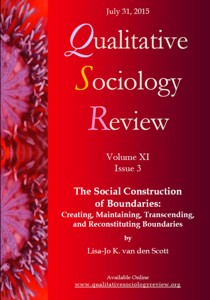Finding My Place: Birth Mothers Manage the Boundary Ambiguity of Adoption Reunion Contact
DOI:
https://doi.org/10.18778/1733-8077.11.3.07Keywords:
Adoption Reunion, Motherhood, Contact Expectations, Boundary Ambiguity, Adoption Triad RolesAbstract
This study describes how essentialist notions of motherhood infl uence adoption reunion outcomes. The data analysis is based primarily on in-depth interviews with 33 reunited birth mothers. Collectively, the birth mothers perceived themselves to be the mothers of a child lost to them through adoption. Reunion contact jeopardized this perception when the mothers met adopted adults who did not accept their mothering overtures. Continued contact meant suppressing their motherhood desires and taking on a reunion role more consistent with their adoption triad position.
Downloads
References
Bock, Jane D. 2000. “Doing the Right Thing? Single Mothers by Choice and the Struggle for Legitimacy.” Gender and Society 14(1):62-86.
Google Scholar
DOI: https://doi.org/10.1177/089124300014001005
Brodzinsky, David and Susan Livingston Smith. 2014. “Post-Placement Adjustment and the Needs of Birthmothers Who Place an Infant for Adoption.” Adoption Quarterly 17(3):165-184.
Google Scholar
DOI: https://doi.org/10.1080/10926755.2014.891551
Charmaz, Kathy. 2006. Constructing Grounded Theory: A Practical Guide Through Qualitative Analysis. Thousand Oaks, CA: Sage.
Google Scholar
Cox, Pamela. 2012. “Marginalized Mothers, Reproductive Autonomy, and ‘Repeat Losses to Care.’” Journal of Law and Society 39(4):541-561.
Google Scholar
DOI: https://doi.org/10.1111/j.1467-6478.2012.00599.x
Fischer, Robert. 2002. “The Emerging Role of Adoption Reunion Registries: Adoptee and Birthparent Views.” Child Welfare 81(3):445-470.
Google Scholar
Fontenot, Holly B. 2007. “Transition and Adaptation to Adoptive Motherhood.” Journal of Obstetric, Gynecologic, and Neonatal Nursing 36(2):175-182.
Google Scholar
DOI: https://doi.org/10.1111/j.1552-6909.2007.00134.x
Fravel, Deborah L., Ruth G. McRoy, and Harold D. Grotevant. 2000. “Birth Mother Perceptions of the Psychologically Present Adopted Child: Adoption Openness and Boundary Ambiguity.” Family Relations 49(4):425-433.
Google Scholar
DOI: https://doi.org/10.1111/j.1741-3729.2000.00425.x
Ge, Xiaojia et al. 2008. “Bridging the Divide: Openness in Adoption and Postadoption Psychosocial Adjustment Among Birth and Adoptive Parents.” Journal of Family Psychology 22(3):529-540.
Google Scholar
DOI: https://doi.org/10.1037/a0012817
Glaser, Barney and Anselm Strauss. 1967. The Discovery of Grounded Theory: Strategies for Qualitative Research. New York: Aldine Publishing Company.
Google Scholar
Gustafson, Diana L. 2005. Unbecoming Mothers: The Social Production of Maternal Absence. New York: Haworth Press.
Google Scholar
Hays, Sharon. 1996. The Cultural Contradictions of Motherhood. New Haven: Yale University Press.
Google Scholar
Henny, Susan M. et al. 2007. “Evolution and Resolution: Birthmothers’ Experience of Grief and Loss at Different Levels of Adoption Openness.” Journal of Social and Personal Relationships 24(6):875-889.
Google Scholar
DOI: https://doi.org/10.1177/0265407507084188
Hertz , Rosanna. 2006. Single by Chance, Mothers by Choice: How Women Are Choosing Parenthood Without Marriage and Changing the American Family. New York: Oxford University Press.
Google Scholar
Howe, David and Julia Feast. 2001. “The Long-Term Outcome of Reunions Between Adult Adopted People and Their Birth Mothers.” British Journal of Social Work 31:351-368.
Google Scholar
DOI: https://doi.org/10.1093/bjsw/31.3.351
Jackson, Debra and Judy Mannix. 2004. “Giving Voice to the Burden of Blame: A Feminist Study of Mothers’ Experiences of Mother Blaming.” International Journal of Nursing Practice 10:150-158.
Google Scholar
DOI: https://doi.org/10.1111/j.1440-172X.2004.00474.x
Kilty, Jennifer M. and Erin Dej. 2012. “Anchoring Amongst the Waves: Discursive Constructions of Motherhood and Addiction.” Qualitative Sociology Review 8(3):6-23.
Google Scholar
DOI: https://doi.org/10.18778/1733-8077.8.3.01
Livingstone, Kate. 2012. “The Birthmother’s Dilemma: Resisting Feminist Exclusions in the Study of Adoption.” Pp. 58-72 in Adoption and Mothering, edited by Frances J. Latchford. Bradford: Demeter Press.
Google Scholar
March, Karen. 2014. “Birth Mother Grief and the Challenge of Adoption Reunion Contact.” American Journal of Orthopsychiatry 84(4):1-11.
Google Scholar
DOI: https://doi.org/10.1037/ort0000013
March, Karen and Charlene E. Miall. 2006. “Reinforcing the Motherhood Ideal: Perceptions of Biological Mothers Who Make an Adoption Plan.” Canadian Review of Sociology and Anthropology 43:367-386.
Google Scholar
DOI: https://doi.org/10.1111/j.1755-618X.2006.tb01139.x
Pertman, Adam. 2006. “Adoption in the Media: In Need of Editing.” Pp. 60-70 in Adoptive Families in a Diverse Society, edited by Katrina Wegar. New Jersey: Rutgers University Press.
Google Scholar
Seigel, Deborah H. 2006. “Open Adoption and Family Boundaries.” Pp. 177-189 in Adoptive Families in a Diverse Society, edited by Katrina Wegar. New Jersey: Rutgers University Press.
Google Scholar
Sieger, Katherine. 2012. “A Birthmother’s Identity: [M]other Living on the Border of (Non) Motherhood.” Pp. 42-57 in Adoption and Mothering, edited by Frances J. Latchford. Bradford: Demeter Press.
Google Scholar
Stoneman, Lou, Jan Thompson, and Joan Webber. 1980. Adoption Reunion: A Study of the Effect of Reunion Upon Members of the Adoption Triad and Their Families. Toronto: Children’s Aid Society of Metropolitan Toronto.
Google Scholar
Triseliotis, John, Julia Feast, and Fiona Kyle. 2005. The Adoption Triangle Revisited: A Study of Adoption, Search, and Reunion Experiences. London: British Association for Adoption and Fostering.
Google Scholar
Uhrlaub, Richard and Nikki McCaslin. 2012. “Culture, Law, and Language: Adversarial Motherhood in Adoption.” Pp. 189-206 in Adoption and Mothering, edited by Frances J. Latchford. Bradford: Demeter Press.
Google Scholar
Downloads
Published
How to Cite
Issue
Section
License

This work is licensed under a Creative Commons Attribution-NonCommercial-NoDerivatives 4.0 International License.











